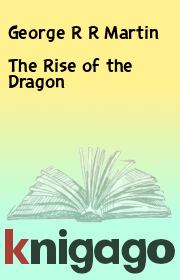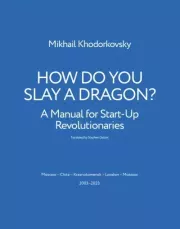Mikhail Khodorkovsky - How Do You Slay A Dragon
Название: | How Do You Slay A Dragon | |
Автор: | Mikhail Khodorkovsky | |
Жанр: | Старинная литература | |
Изадано в серии: | неизвестно | |
Издательство: | неизвестно | |
Год издания: | 2022 | |
ISBN: | неизвестно | |
Отзывы: | Комментировать | |
Рейтинг: | ||
Поделись книгой с друзьями! Помощь сайту: донат на оплату сервера | ||
Краткое содержание книги "How Do You Slay A Dragon"
Right at the start of this book, I had a great surprise. I know Mikhail Khodorkovsky’s story well. I reported for the BBC on his rise to prominence in the YUKOS oil company, his disputes with the newly-elected Russian President, Vladimir Putin, in the first years of the twenty-first century, and his arrest on trumped-up charges in October 2003 and subsequent imprisonment. Four days after his arrest I was due to have a meeting with him in Moscow. Instead, a meeting was arranged with a representative of the Russian Prosecutor’s Office to explain the arrest. The trial hadn’t yet begun. But the outcome was already evident.
К этой книге применимы такие ключевые слова (теги) как: Политика и события
Читаем онлайн "How Do You Slay A Dragon". [Страница - 4]
I have absolutely no doubts that we can get rid of Putin. In any case, sooner or later he’ll depart this life: there are no immortal dictators. But Putinism, Stalinism and autocracy will keep returning to Russia again and again all the while that the socio-political and institutional preconditions exist for them. Although it’s always easier and more convenient to personalise evil, it’s not a question of individuals but of objective preconditions that allow anyone who reaches the pinnacle of power in Russia to become a Putin, a Brezhnev or a Stalin. This works even stronger than the laws of physics. Whether a revolutionary or an innovator or a liberator comes to power, they depart as a dictator, a satrap and someone who throttles freedom, because they’ve taken over power along with a pathetic cabal of corrupt henchmen. The specific name means nothing, because the reality of life in Russia breaks anyone. A specific example is that it wasn’t a case of Putin breaking Russia, but traditional Russia crushing Putin under its own weight. It was this understanding that Russia always seems doomed to repeat its own history that led me to seek a possible solution to this threat.
Gradually I’ve come to the deep conviction that the existing form of power in Russia simply maintains the traditional system of autocracy, and that without revolutionary change it will be impossible to escape from this autocratic trap. I’ve come to the conclusion that given Russia’s historical traditions and experience of politics, only a parliamentary form of government would be acceptable. Of course, we’re talking here about a proper parliamentary republic, and not the rubber-stamp version that was typical of the Soviet “parliament”.
In Russia, any other form of government, whereby all the executive functions of power are in the hands of the formal head of state, would inevitably sooner or later lead to the re-emergence of an autocratic and totalitarian regime. This would be for the simple reason that the cultural, economic and socio-political restrictions that prevent a state from sliding into the bog of authoritarianism, are simply too under-developed in Russia. Any individual, even the weakest, who found themselves at the top of the pyramid of power, would not be able to stop themselves from being seduced into crushing that pyramid beneath them. This makes it essential to slice the top off this pyramid.
I see my mission as follows: to convince those who share my views and wish to see Russia free – not just for a couple of months or even years, but for decades to come – that this can be achieved. But it will happen only once we have built a genuine federal parliamentary republic in Russia, with a developed system of self-government. It is vital to rid ourselves of a dictator; it is vital to investigate the crimes committed by this regime; it is vital to re-establish even the most basic democratic norms in the country and to bring back justice and the rule of law. And what is even more vital is that this is carried out in such a way that everything that we put back cannot be lost once more. That is possible only by moving to a parliamentary republic.
Building such a republic in Russia is far more complicated than overturning Putin’s regime. It calls for a genuine revolution, one that doesn’t simply scratch the surface of political life, but overturns the very foundations of the traditional Russian way of life. A revolution such as this demands massive efforts and sacrifices, it means taking risks and changing literally everything, from the bottom to the very top. But only such an all-encompassing revolution can provide Russia with the long-term immunity that it needs to rid itself of autocracy and the opportunity to build a new way of life suitable for the modern, post-industrial, global world.
It's important at this point to explain what I understand by “revolution”. I am absolutely convinced that revolution in Russia is inevitable and that it’s desperately needed. This doesn’t alter my extreme dislike of revolutions in principle, nor my deep regret that Russia has gone so far down an historic dead-end that the only possible way out is through a revolution. Any revolution represents a trial for a society, even when it brings with it a wonderful future. At the same time, a revolution does not necessarily mean street battles, storming buildings, seizing post-offices, bridges and the telegraph office. Such events are not indicative of a revolution but of an uprising. Yes, such incidents often accompany a revolution, but they are not essential and, what’s more, are not the main component of a revolution.
What I understand by “revolution” is a total reset of the fundamental principles of the life of a society, which completely alters the course of that society’s historical development. Whether or not such a reset of the fundamentals is accompanied by social explosions or whether it passes off without so much as a whimper is a secondary question. Most important of all is the result. In my opinion, Russia’s move to become a parliamentary republic is only the tip of the iceberg. By “parliamentary republic”, I mean the country being run by a government made up of representatives of a coalition of parties that control a parliament chosen by free and fair elections, and which, in turn represents a genuinely wide majority of society. At the foundation of such a republic lie fundamental changes to the most varied aspects of the life of society, the implementation of which is essential in order that the system of parliamentary democracy remains sustainable and stable. The most important of all these changes is the switch to a genuinely federal system where cities are self-governing. Only the cities can provide the political basis for a stable parliamentary republic.
In the case of Russia, a parliamentary republic and federalism are inseparable from each other. In order to drag Russia out of the rut of autocracy and place it firmly on a stable democratic trajectory, there has to be a move to a parliamentary republic. And in order to ensure that this parliamentary republic does not become yet another façade for autocracy, it must be strengthened by a federal system.
This is already a profound revolution: a country that for centuries has been accustomed to regard itself by looking from the top down, must learn to look at itself from the bottom up. The logic here is simple. There are practically no democratic political traditions in Russia; what there has been is basically anti-democratic. Civil society didn’t succeed in establishing itself properly, and today it’s been practically wiped out. Even if favourable – close to ideal – conditions were to arise (and I seriously doubt that this is possible), the re-establishment of civil society even to the levels previously achieved would take years. And this is bearing in mind that the previous level of civil society was very basic. At the federal level, just as at the local level, there is no party system. All the existing parties are either fake – created or dominated by the authorities themselves – or they’re marginal groups, united around their petty leaders and holding no serious weight among the majority of the population.
In such conditions, from where can a parliamentary system come with the stability needed to be an alternative to autocracy? Where is the necessary strength in such a feeble world? Only in the regions. It is only
--">Книги схожие с «How Do You Slay A Dragon» по жанру, серии, автору или названию:
 |
| George R R Martin - The Rise of the Dragon Жанр: Старинная литература Год издания: 101 |
 |
| Mikhail Khodorkovsky - HOW DO YOU SLAY A DRAGON? Жанр: Старинная литература Год издания: 2022 |


